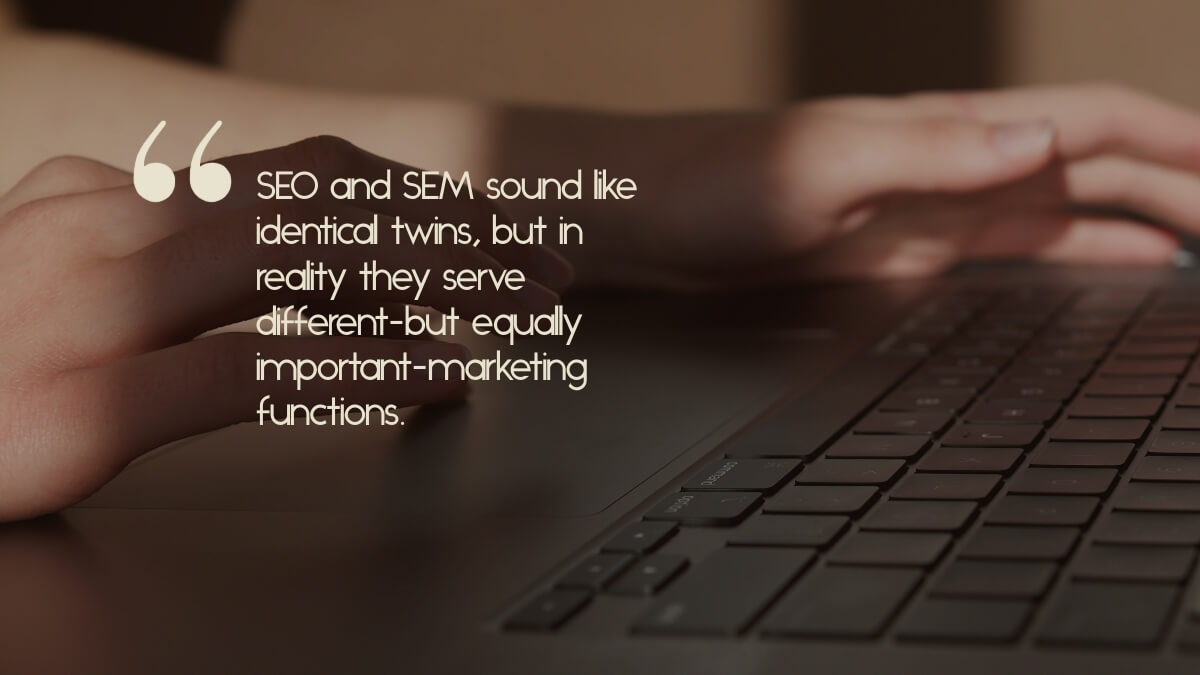What is the difference between SEO and SEM: the small business owner’s guide

Just about everyone has heard about SEO and SEM. SEO, particularly, gets talked about a lot; even small business owners with very little marketing experience trot it out when we meet with them. And, indeed, both SEO and SEM are important tools for any business owner.
The problem is that there is a lot of confusion between the two terms, despite the fact that they are entirely different things. And even worse, people rarely ask for clarification—either because they don’t want to admit that they don’t know, or because they don’t realize that there actually IS much difference.
So, in the interests of making everything clear, here’s the quick and dirty on what the heck SEO and SEM are, and how they are different.
What is SEM?
First, let’s start with SEM. It stands for Search Engine Marketing and refers to paid advertising on search engines like Google and Bing. These are the ads that you see at the top of the results when you search for something. You can tell they are ads because they say so, in a little box in the corner of the ad.
From a small business perspective, SEM is a really excellent way to get your product or service in front of people at the very moment that they are looking for it. This makes it extremely effective for most businesses. You bid on certain search terms that are related to your product/service, and if your bid is enough (and you meet some other criteria) your ad appears when someone searches for that term. I won’t go into a lot of detail, here, but if you want to read more about SEM, check out this article from a little while back.
The great thing about SEM is that you can fire it up and start showing ads (and attracting customers) immediately. That said, if you shut off the money, you shut off your ads.
What is SEO?
Now, let’s talk about SEO. SEO stands for Search Engine Optimization and refers to the (wide) variety of optimization activities that you do to try to get your website to show up high in the natural rankings when someone searches for a term associated with your product or service. The natural rankings are all the results that show up below the ads. You do not pay for these placements, so it’s technically “free”, though many SEO activities can cost you money. Despite sounding really similar to Search Engine Marketing, it actually only has that one thing in common: they both focus on the keywords that people may search for.
You can improve your SEO by doing things like making sure your important keywords are used frequently in your website, making sure you have keyword-rich page descriptions, making sure your site is optimized and user-friendly, adding key-word rich alternative descriptions for images, and adding blogs regularly… among a lot of other stuff (if you want to learn more about SEO, check out our article on the subject here).
The important thing to remember about SEO is that, unlike SEM which can kick in immediately and have an instant effect on your business, SEO is a long-term play. You actually have very little control over how your site is going to show up. It can take months and even years to pay off, depending on how crowded your field is, and how much competition there is for the terms that are important to your business. If you have a few competitors that have had really SEO-optimized sites up for a long time, you might never achieve the ranking you want through SEO alone.
Which is better for small business marketing: SEO or SEM?
Now that you understand what SEO and SEM are, you may be asking which you should focus on. Frankly, that’s the wrong way to look at it, because SEO and SEM serve different marketing purposes. A smart business will work on both. While the natural rankings you achieve through SEO aren’t dependent on your budget and are more compelling to searchers (organic traffic usually stays on your site longer, reads more pages, and converts better), there’s no guarantee that all your SEO efforts will get you to the top of the first page… ever. And, my friends, if you’re not on that first page, people simply won’t find you. SEM ads, on the other hand, guarantee that you’re front and center when people are searching for your product or service… as long as you keep the money going.
Our advice? Focus on SEM to make sure you’re getting customers immediately, but also build good SEO into your website and use a blog to keep things active. In other words, think of SEM as a specific marketing campaign, and SEO as a baseline practice that you keep running in the background.
Together, they pretty much make the perfect team.
Happy small business marketing,
Katie & Theron
At Urban Sherpa Marketing Co. we offer marketing advisory, strategic planning, and services for small businesses and startups, including content marketing. Our goal is to make high-quality marketing possible for every business, no matter the size. Think of us as your outsourced marketing department, strategic marketing adviser, or even your phone-a-friend marketing lifeline.
Share this on:

